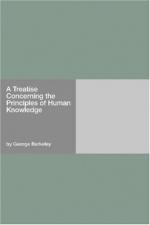15. Not conclusive as to extension.—In short, let any one consider those arguments which are thought manifestly to prove that colours and taste exist only in the mind, and he shall find they may with equal force be brought to prove the same thing of extension, figure, and motion. Though it must be confessed this method of arguing does not so much prove that there is no extension or colour in an outward object, as that we do not know by sense which is the true extension or colour of the object. But the arguments foregoing plainly show it to be impossible that any colour or extension at all, or other sensible quality whatsoever, should exist in an unthinking subject without the mind, or in truth, that there should be any such thing as an outward object.
16. But let us examine a little the received opinion.—It is said extension is a mode or accident of matter, and that Matter is the substratum that supports it. Now I desire that you would explain to me what is meant by Matter’s supporting extension. Say you, I have no idea of Matter and therefore cannot explain it. I answer, though you have no positive, yet, if you have any meaning at all, you must at least have a relative idea of Matter; though you know not what it is, yet you must be supposed to know what relation it bears to accidents, and what is meant by its supporting them. It is evident support cannot here be taken in its usual or literal sense—as when we say that pillars support a building; in what sense therefore must it be taken? [Note.]
[Note: “For my part, I am not able to discover any sense at all that can be applicable to it.”—Edit 1710.]
17. Philosophical meaning of “Material substance” Divisible into two parts.—If we inquire into what the most accurate philosophers declare themselves to mean by material substance, we shall find them acknowledge they have no other meaning annexed to those sounds but the idea of being in general, together with the relative notion of its supporting accidents. The general idea of Being appeareth to me the most abstract and incomprehensible of all other; and as for its supporting accidents, this, as we have just now observed, cannot be understood in the common sense of those words; it must therefore be taken in some other sense, but what that is they do not explain. So that when I consider the two parts or branches which make the signification of the words material substance, I am convinced there is no distinct meaning annexed to them. But why should we trouble ourselves any farther, in discussing this material substratum or support of figure and motion, and other sensible qualities? Does it not suppose they have an existence without the mind? And is not this a direct repugnancy, and altogether inconceivable?




